|
Books Should Be Free Loyal Books Free Public Domain Audiobooks & eBook Downloads |
|
|
Books Should Be Free Loyal Books Free Public Domain Audiobooks & eBook Downloads |
|
Top Authors |
|---|
|
Book type:
Sort by:
|
By: George MacDonald (1824-1905) | |
|---|---|
 St. George and St. Michael
St. George and St. Michael
| |
 Weighed and Wanting
Weighed and Wanting
| |
 Warlock o' Glenwarlock
Warlock o' Glenwarlock
| |
 Wilfrid Cumbermede
Wilfrid Cumbermede
| |
 Salted with Fire
Salted with Fire
| |
 A Hidden Life and Other Poems
A Hidden Life and Other Poems
| |
 The Gifts of the Child Christ
The Gifts of the Child Christ
It's the Advent season in London but all is not well in the Greatorex household. All this will change with a surprise on Christmas morning. (Ann Boulais) | |
 Home Again
Home Again
| |
 The Tragedie of Hamlet, Prince of Denmark A Study with the Text of the Folio of 1623
The Tragedie of Hamlet, Prince of Denmark A Study with the Text of the Folio of 1623
| |
 Gutta-Percha Willie
Gutta-Percha Willie
| |
 Rampolli
Rampolli
| |
 Seaboard Parish
Seaboard Parish
This is Second book of Three series. All the same characters from the first book, just with a few new friends and family members. The Pastor moves up by the Sea and starts preaching at the Parish there. He and his wife have two daughters by now, who he loves so much. One of his daughters is ill, so they go to the Sea thinking the fresh air air will improve her health. While they are there, they meet an Artist whose gentlemanly ways, and strong personality wins the family's hearts, especially one of the daughter's heart. They have many adventures in the Parish. Filled with many heartwarming moments, and daring adventure. | |
 Thomas Wingfold, Curate V2
Thomas Wingfold, Curate V2
| |
 Thomas Wingfold, Curate V3
Thomas Wingfold, Curate V3
| |
 Thomas Wingfold, Curate V1
Thomas Wingfold, Curate V1
| |
By: Voltaire (1694-1778) | |
|---|---|
 Candide
Candide
A picaresque novel written by French satirical polemicist and philosopher Voltaire, Candide blatantly attacks the ideology of philosopher Leibniz. Candide follows the series of unfortunate events encountered by the young, yet blindly optimistic Candide. Shifting from one adventure to the next, Voltaire’s signature piece does not cease to grip its audience with its humorous criticism of power, wealth, love, religion, philosophy and especially optimism. The novel begins with the introduction of the protagonist Candide, who lives in the castle of an influential German Baron, along with the Baron’s daughter Cunégonde, and tutor Dr... | |
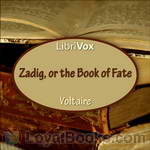 Zadig, or the Book of Fate
Zadig, or the Book of Fate
Zadig, ou La Destinée, (”Zadig, or The Book of Fate”) (1747) is a famous novel written by the French Enlightenment philosopher Voltaire. It tells the story of Zadig, a philosopher in ancient Babylonia. The author does not attempt any historical accuracy, and some of the problems Zadig faces are thinly disguised references to social and political problems of Voltaire’s own day. The book is philosophical in nature, and presents human life as in the hands of a destiny beyond human control. It is a story of religious and metaphysical orthodoxy, both of which Voltaire challenges with his presentation of the moral revolution taking place in Zadig himself... | |
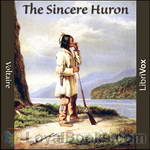 The Sincere Huron
The Sincere Huron
L’Ingénu is a satirical novella by the French writer Voltaire, published in 1767. It tells the story of a Huron Indian transported to the sophistication of eighteenth century Paris, and satirizes religious doctrine, as well as the folly and injustices of French society. | |
By: Carlo Collodi (1826-1890) | |
|---|---|
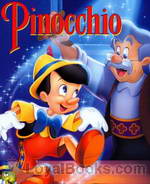 The Adventures of Pinocchio
The Adventures of Pinocchio
An old carpenter carves a little wooden puppet from a mysterious piece of wood that seems to have the ability to talk! He begins to love the little creature like his own son and names him Pinocchio. But the mischievous fellow runs away from his loving father as soon as he learns to walk. The Adventures of Pinocchio by Carlo Collodi follows the misadventures and naughty exploits of this delightfully “human” puppet who in his heart of hearts longs only to become a real boy. Carlo Collodi was the pen name of a gifted writer of children's books, Carlo Lorenzini who lived in Florence, Italy, during the late 19th century... | |
 Pinocchio
Pinocchio
This is the wonderful story of Pinocchio, the puppet who must learn many lessons before he can become a real boy. Carved by a woodcarver named Geppetto in a small Italian village, he dreamed of becoming a real boy but strays from the path of goodness many times and is very willing to listen to temptation. He has also been used as a character who is prone to telling lies and fabricating stories for various reasons. The story has appeared in many adaptations in other mediums. Pinocchio has been called an icon of modern culture, and one of most reimagined characters in the pantheon of children's literature... | |
By: Friedrich Nietzsche (1844-1900) | |
|---|---|
 Beyond Good and Evil
Beyond Good and Evil
Beyond Good and Evil, by Friedrich Nietzsche A searing indictment of concepts like “truth” and “language” Beyond Good and Evil, by Friedrich Nietzsche is a deeply thought provoking book that forms one of the keystones of modern thought and politics. In this book, Nietzsche takes the position that our subservience to fixed perspectives that are forced on us by our language and our ideals make us incapable of perceiving reality. He propounds the theory that ideals are not fixed but change over time, often dramatically, and end up becoming the exact opposite of what they originally were... | |
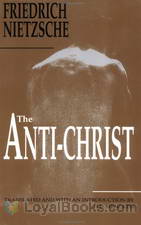 The Antichrist
The Antichrist
Save for his raucous, rhapsodical autobiography, Ecce Homo, The Antichrist is the last thing that Nietzsche ever wrote, and so it may be accepted as a statement of some of his most salient ideas in their final form. Of all Nietzsche’s books, The Antichrist comes nearest to conventionality in form. It presents a connected argument with very few interludes, and has a beginning, a middle and an end. | |
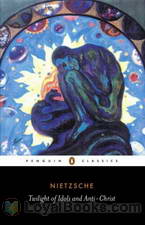 The Twilight of the Idols or How to Philosophise with the Hammer
The Twilight of the Idols or How to Philosophise with the Hammer
Of The Twilight of the Idols, Nietzsche says in Ecce Homo: “If anyone should desire to obtain a rapid sketch of how everything before my time was standing on its head, he should begin reading me in this book. That which is called ‘Idols’ on the title-page is simply the old truth that has been believed in hitherto. In plain English, The Twilight of the Idols means that the old truth is on its last legs.” Certain it is that, for a rapid survey of the whole of Nietzsche’s doctrine, no book, save perhaps the section entitled “Of Old and New Tables” in Thus Spake Zarathustra, could be of more real value than The Twilight of the Idols... | |
 Thus Spake Zarathustra: A Book for All and None
Thus Spake Zarathustra: A Book for All and None
Friedrich Wilhelm Nietzsche (1844–1900) was a nineteenth-century German philosopher. He wrote critical texts on religion, morality, contemporary culture, philosophy and science, using a distinctive German language style and displaying a fondness for aphorism. Nietzsche’s influence remains substantial within and beyond philosophy, notably in existentialism and postmodernism. Thus Spake Zarathustra is a work composed in four parts between 1883 and 1885. Much of the work deals with ideas such as the “eternal recurrence of the same”, the parable on the “death of God”, and the “prophecy” of the Overman, which were first introduced in The Gay Science... | |
 The Joyful Wisdom
The Joyful Wisdom
The Joyful Wisdom (later translated as The Gay Science), written in 1882, just before Zarathustra, is rightly judged to be one of Nietzsche’s best books. Here the essentially grave and masculine face of the poet-philosopher is seen to light up and suddenly break into a delightful smile. The warmth and kindness that beam from his features will astonish those hasty psychologists who have never divined that behind the destroyer is the creator, and behind the blasphemer the lover of life. In the retrospective... | |
By: Joseph Conrad (1857-1924) | |
|---|---|
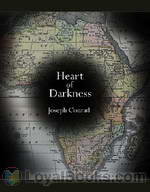 Heart of Darkness
Heart of Darkness
First published in Blackwood’s magazine as a three part serial in 1899 and published in 1902, Heart of Darkness centers on the experiences of protagonist Charles Marlow as he is assigned the duty to transport ivory down the Congo River. Conrad cleverly uses foreshadowing as a technique to convey the novella’s themes of hypocritical imperialism, the contradictory views on civilized as opposed to barbaric societies, racism, and the conflict between reality and darkness. Set in the second half of the nineteenth century, the story begins with the introduction of protagonist Charles Marlow, who is on board a boat harbored in the River Thames... | |
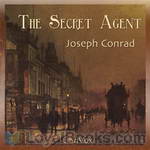 The Secret Agent
The Secret Agent
In this world of modern day spying, Joseph Conrad's spy story, The Secret Agent, is very pertinent. It deals with the over reaching influence of politics in everyday life, the sordid underbelly that lies beneath our civilization's sophisticated veneer, the strange persuasive power of anarchy, unbridled capitalism and its tragic consequences and the scourge of terrorism, exploitation and espionage. In an uncannily prophetic plot, The Secret Agent portrays a sinister scheme to bomb the famous Greenwich Observatory in London... | |
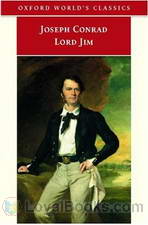 Lord Jim
Lord Jim
This story opens on a ship crowded with pilgrims traveling from Singapore to Mecca for the hajj. A young Englishman is the vessel's first mate. This is his first job and it is something that he has longed for all his life—to be on board a ship that sails the seven seas. One night as the ship sails through the calm waters of the Arabian Sea, it mysteriously begins to shudder. The crew, including the young first mate, believe that it is about to sink. They decide to strike out for themselves in a life-boat, abandoning the passengers... | |
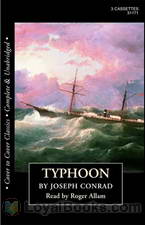 Typhoon
Typhoon
First published in 1902 as a serial in Pall Mall Magazine, the adventure novel follows the disrupting events onboard a steamboat after it takes a perilous course at sea, which triggers a state of mayhem onboard the steamer. Furthermore, the incident prompts the crew to gradually reveal their true nature which is brought to light in the time of crisis. Interestingly, the tale is believed to possess some autobiographical elements taken from Conrad’s own experiences at sea, which provide the novel with a strong foundation, as he effectively uses personification, imagery, and descriptive language to accurately illustrate the danger and chaos instigated by a powerful storm at sea... | |
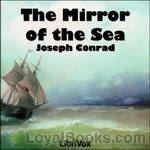 The Mirror of the Sea
The Mirror of the Sea
The Mirror of the Sea is a collection of autobiographical essays first published in various magazines 1904-6. Conrad early in his life earned his bread as a Master Mariner in sailing ships. In his Author’s Note to this work, Conrad states,”Beyond the line of the sea horizon the world for me did not exist….Within these pages I make a full confession not of my sins but of my emotions. It is the best tribute my piety can offer to the ultimate shapers of my character, convictions, and, in a sense, destiny—to the imperishable sea, to the ships that are no more, and to the simple men who have had their day.” | |
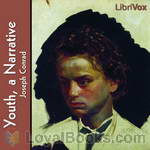 Youth, a Narrative
Youth, a Narrative
An autobiographical short story written in 1898 and included as the first story in the 1902 volume Youth, a Narrative, and Two Other Stories. This volume also includes Heart of Darkness and The End of the Tether, which are concerned with maturity and old age, respectively. “Youth” is narrated by Charles Marlow who is also the narrator of Heart of Darkness, Lord Jim and Chance. Youth depicts his first journey to the East.” | |
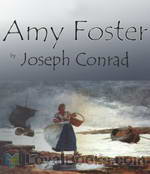 Amy Foster
Amy Foster
Classic shortish story by Conrad that relates his self-thought alienation from British society, as a young foreign man survives a shipwreck off the coast of Kent, England only to be shunned by most of the townsfolk. The one exception is the loving, if dull-witted, Miss Foster. | |